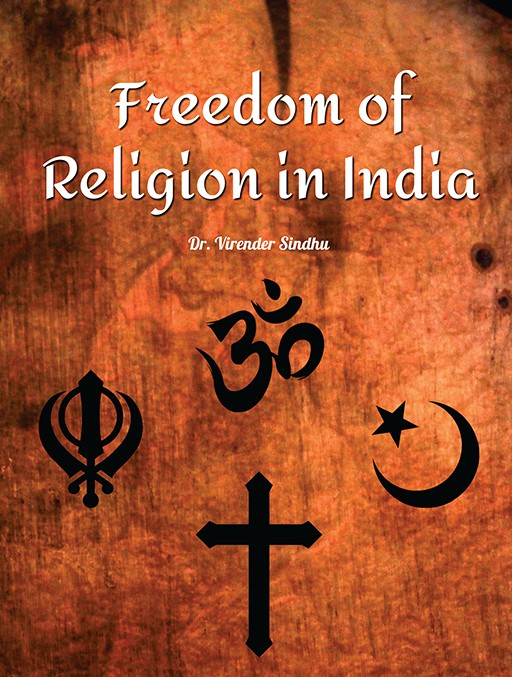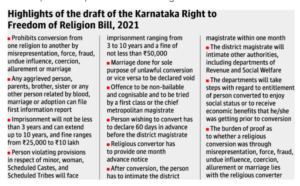Published on: December 18, 2021

KARNATAKA ANTI CONVERSION BILL
KARNATAKA ANTI CONVERSION BILL

CONTEXT
- Karnataka government to table anti-conversion law in state legislature winter session
- Blueprint of the new legislation is ready
- Government has also sent the blueprint for scrutiny twice
- Move comes in after news of conversion of mother of a ruling party MLA
- Legal department has studied anti-conversion laws brought in Uttar Pradesh, Uttarakhand, Gujarat, Himachal Pradesh, Madhya Pradesh and other states in the country.
COMPONENTS OF THE BILL
- It is in lines of Cow slaughter Act and act on preservation of religious structures introduced in Monsoon session to stop temple demolitions in the state.
- Law will have stringent measures against forceful conversions
- Forceful conversions will be declared null and void
- Give free hand for police and authorities to initiate direct legal action against those involved in forceful conversions.
- The person who is getting converted must declare about his decision before a government authority which will be empowered to conduct a probe to ascertain if there is any force behind such decisions.
- The onus of proving that there is no forceful conversion will be with the individual. Any crime under the new law is going to be a non-bailable offence.
- Persons involved in forceful conversions would be imprisoned for one to five years.
- If any minor, woman or people belonging to scheduled caste and tribes are forcefully converted, it would fetch 10 years’ imprisonment

WHAT DOES CONSTITUTION SAY
- Article 25 provides four types of freedom for religious activity.
- Freedom of conscience: Inner freedom of an individual to mold his relation with God or Creatures in whatever way he desires.
- Right to profess: Declaration of one’s religious beliefs and faith openly and freely.
- Right to practice: Performance of religious worship, rituals, ceremonies and exhibition of beliefs and ideas.
- Right to propagate: Transmission and dissemination of one’s religious beliefs to others or exposition of the tenets of one’s religion.
- It does not include a right to convert another person to one’s own religion.
- Forcible conversions not allowed because the ‘freedom of conscience’ guaranteed to all persons alike
- The above-mentioned freedoms are subject to public order, health, and morality.
- This article also gives a provision that the State can make laws:
- That regulates and restricts any financial, economic, political, or other secular activity associated with any religious practice.
- That provides for the social welfare and reform or opening up of Hindu religious institutions of a public character to all sections and classes of Hindus. Under this provision, Hindus are construed as including the people professing the Sikh, Jain, or Buddhist religions, and Hindu institutions shall also be construed accordingly.
WHY A LAW MAY BE NECESSARY :
- To bring communal activities under control. Example : Love Jihad
- To check forceful propagations of one’s religion, which may eventually lead to conversions
- Power has been given to state under Article 25
- Article 25 covers not only religious beliefs (doctrines) but also religious practices (rituals).
- Conversions may hamper the lifestyle of backward sections of society like tribals which may alter their cultural pattern
WHY A LAW MAY NOT BE NECCESARY :
- As seen Article 25 specifies procedure for conversions
- New law will invoke tensions among various religious groups of society
- A strong faith may not change under persuasions
- Chances of Misuse and law may become draconian
WAY FORWARD
- The crux of law is to avoid Persuasion and forceful conversions among backward classes and tribals of society.
- A law though maybe present how well can its knowledge reach the masses makes a point.
- Government must work on improving living standards of such sections and increasing their knowledge about present happenings.

